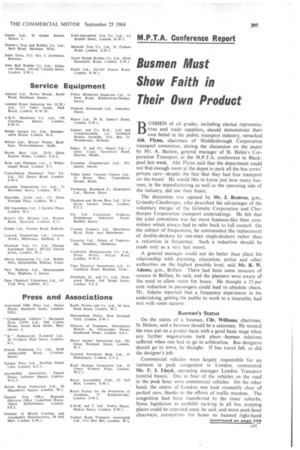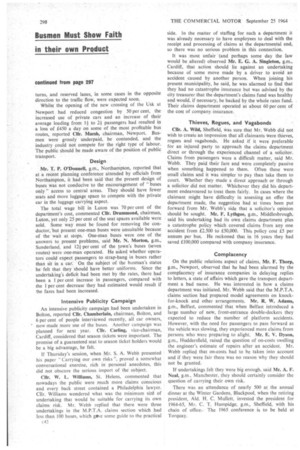M.P.T.A. Conference Report
Page 301

Page 302

If you've noticed an error in this article please click here to report it so we can fix it.
Busmen Must Show Faith in Their Own Product
BUSMEN of all grades, including elected representatives and trade suppliers, should demonstrate their own belief in the public transport industry, remarked Aid. Flynn, chairman of Middlesbrough Corporation transport committee, during the discussion on the paper by Mr. A. Barlow, general manager of St. Helen's Corporation Transport, at the M.P.T.A. conference in Blackpool last week. Aid. Flynn said that the department could not find enough room at the depot to park all the bus crews' private cars—despite the fact that they had free transport on the buses! He would like to know just how many busmen, in the manufacturing as well as the operating side of the industry, did use their buses.
The discussion was opened by Mr. I. Rostron, g.m., Grimsby-Cleethorpes, who described the advantages of the voluntary merger of the Grimsby Corporation and Cleethorpes Corporation transport undertakings. He felt that the joint committee was far more business-like than committees which always had to refer back to full council. On the subject of frequencies, he commended the replacement of double-deckers by one-man single-deckers rather than a reduction in frequency. Such a reduction should be made only as a very last resort.
A general manager could not do better than place his relationship with planning, education, police and other authorities on the highest possible level, said Mr. R. W. Adams, g.m., Belfast. There had been some measure of success in Belfast, he said, and the planners were aware of the need to allow room for buses. He thought a 25 per cent reduction in passengers could lead to absolute chaos. Mr. Adams reported that a frequency experiment in his undertaking, getting the public to work to a timetable, had met with some success.
Busman's Status
On the status of a busman, Cllr Williams, chairman, St. Helens, said a busman should be a salesman. He wanted the men put on a proper basis with a good basic wage when any further negotiations took place—human relations suffered when one had to go to arbitration. Bus designers should go to town, he thought. If bus travel fell, so did the designer's job.
Commercial vehicles were largely responsible for an increase in peak congestion in London, commented Mr. F. J. Lloyd, operating manager London Transport (central buses). One in four of the vehicles on the road in the peak hour were commercial vehicles, On the other hand, the centre of London was kept resonably clear of parked cars, thanks to the efforts of traffic wardens. The congestion had been transferred to the inner suburbs. Some legislation to prohibit parking in all bus stopping places could be expected soon, he said, and more peak-hour clearways, exemptions for buses on banned right-hand
turns, and reserved lanes, in some cases in the opposite direction to the traffic flow, were expected soon.
Whilst the opening of the new crossing of the Usk at Newport had reduced congestion by 50 per cent, the increased use of private cars and an increase of their average loading from 11-1 to 2+ passengers had resulted in a loss of £450 a day on some of the most profitable bus routes, reported Clk. Marsh, chairman, Newport. Busmen were grossly underpaid, he contended, and the industry could not compete for the right type of labour. The public should be made aware of the position of public transport.
Design Mr. T. P. O'Donnell, g.m., Northampton, reported that at a recent planning conference attended by officials from Northampton, it had been said that the present design of buses was not conducive to the encouragement of "buses only" access to central areas. They should have fewer seats and more luggage space to compete with the private car in the luggage carrying aspect.
The total wage bill in Luton was 70 per cent of the department's cost, commented Cur. Drummond, chairman, Luton, yet only 25 per cent of the seat spaces available were sold. Some way must be found for removing the conductor, but present one-man buses were unsuitable because of the wait at stops. One-man buses were one of the answers to present problems, said Mr. IN. Morton, g.m., Sunderland, and 121 per cent of the town's buses (seven routes) were one-man operated. He asked whether operators could expect passengers to strap-hang in buses rather than sit in a car. On the subject of the busman's status he felt that they should have better uniforms. Since the undertaking's deficit had been met by the rates, there had been a 1 per cent increase in passengers, compared with the 1 per cent decrease they had estimated would result if the fares had been increased.
Intensive Publicity Campaign An intensive publicity campaign had been undertaken in Bolton, reported Clk. Chamberlain, chairman, Bolton, and 6 per cent of people interviewed recently, all car owners, now made more use of the buses. Another campaign was planned for next year. Clk. Carling, vice-chairman, Cardiff, considered that season tickets were important. The promise of a guaranteed seat to season ticket holders would be a big advantage, he felt.
If Thursday's session, when Mr. S. A. Webb presented his paper "Carrying our own risks ", proved a somewhat conversational exercise, rich in personal anecdotes, this did not obscure the serious import of the subject.
CHr. W. L. Williams, St. Helens, commented that nowadays the public were much more claims conscious and every back street contained a Philadelphia lawyer. Cllr. Williams wondered what was the minimum site of undertaking that would be suitable for carrying its own claims risk. Mr. Webb replied that there were three undertakings in the M.P.T.A. claims section which had less than 100 buses, which gave some guide to the practical c42 side. In the matter of staffing for such a department it was already necessary to have employees to deal with the receipt and processing of claims at the departmental end, so there was no serious problem in this connection.
It was most unfair (and perhaps some day the law would be altered) observed Mr. E. G. A. Singleton, g.m., Cardiff, that action should lie against an undertaking because of some move made by a driver to avoid an accident caused by another person. When joining his present municipality, he said, he was alarmed to find that they had no catastrophe insurance but was advised by the city treasurer.that the department's claims fund was healthy and would, if necessary, be backed by the whole rates fund. Their claims department operated at about 60 per cent of the cost of company insurance.
Thieves, Rogues, and Vagabonds
Clk. A. Wild, Sheffield, was sure that Mr. Webb did not wish to create an impression that all claimants were thieves, rogues and vagabonds. He asked if it were preferable for an injured party to approach the claims department direct or through the experienced channel of a solicitor. Claims from passengers were a difficult matter, said Mr. Webb. They paid their fare and were completely passive when something happened to them. Often these were small claims and it was simpler to pay than take them to court. Whether they made a direct approach or through a solicitor did not matter. Whichever they did his department endeavoured to treat them fairly. In cases where the claimant might have difficulty in assesiing an offer the department made, the suggestion had at times been put forward from Mr. Webb's side that a solicitor's opinion should be sought. Mr. F. Lythgoe, g.m., Middlesbrough, said his undertaking had its own claims department plus a catastrophe policy which covered claims from any one accident from £2,500 to £50,000. This policy cost £5 per annum per bus. He reckoned that in 16 years they had saved £100,000 compared with company insurance.
Complacency
On the public relations aspect of claims, Mr. F. Thorp, g.m., Newport, observed that he had been alarmed by the complacency of insurance companies in delaying replies to letters, a state of affairs which gave the transport department a bad name. He was interested in how a claims department was initiated. Mr. Webb said that the M.P.T.A. claims section had prepared model agreements on knockfor-knock and other arrangements. Mr. R. W. Adams, g.m., Belfast, commented that when Belfast introduced a large number of new, front-entrance double-deckers they expected to reduce the number of platform accidents. However, with the need for passengers to pass forward as the vehicle was slowing, they experienced more claims from persons who were preparing to alight. Mr. E. V. Dyson, g.m., Huddersfield, raised the question of on-costs swelling the engineer's estimate of repairs after an accident. Mr. Webb replied that on-costs had to be taken into account and if they were fair there was no reason why they should not be granted.
If undertakings felt they were big enough, said Mr. A. F. Neal, g.m., Manchester, they should certainly consider the question of carrying their own risk.
There was an attendance of nearly 500 at the annual dinner at the Winter Gardens, Blackpool, when the retiring president, Ald. H. C. Mullett, invested the president for 1964-65, Mr. C. T. Humpidge, g.m., Sheffield, with his chain of office. The 1965 conference is to be held at Torquay.






































































































































































































































































































































































































